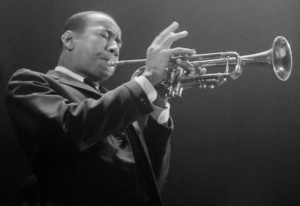Stories of Standards—The Sidewinder
 Tune in weekday mornings for Stories of Standards to hear our favorite versions of “The Sidewinder.” Rodney Franks present Stories of Standards Monday through Friday at 7:50 and 8:50 a.m starting Monday, July 27!
Tune in weekday mornings for Stories of Standards to hear our favorite versions of “The Sidewinder.” Rodney Franks present Stories of Standards Monday through Friday at 7:50 and 8:50 a.m starting Monday, July 27!
Stories of Standards is sponsored by ListenUp – If you love music, you’ll love ListenUp.
“The Sidewinder,” by Lee Morgan, was first released on his 1963 album of the same name. It became Blue Note’s biggest chart success to that point and led to Morgan becoming known as a major jazz figure. The album was also a crossover hit on both pop and R&B charts in 1964, while the song quickly became a jazz standard. About the title, Morgan said “The tune kind of put me in mind of the sidewinder – you know, the ‘bad guy’ on television. There’s a snake called the sidewinder, but I was thinking of the bad guy.” The song was used without Morgan’s permission in an advertisement by Chrysler during the 1965 World Series. When he threatened to sue, Chrysler pulled the ad and settled out of court with Morgan. Drummer Billy Hart said that Morgan had recorded “The Sidewinder” as filler for the album and was puzzled by its turning into his biggest hit.
Lee Morgan (10 July 1938-19 Feb 1972) was a prominent hard bop trumpet player, whose sister Ernestine gave him his first trumpet when he was thirteen. He then took lessons from Clifford Brown, who remained a major influence. As a teenager he played first in Dizzy Gillespie’s band, then on Coltrane’s “Blue Train” album and then with Art Blakey’s Jazz Messengers before starting his own band and going solo. While he rejoined Blakey for a short time after the release of the Sidewinder album, he went on to record both as a leader and as a sideman, having become a major influence on the Blue Note label. In the last two years of his life Morgan became politically active as a leader of the Jazz and People’s Movement, which protested the lack of jazz bands on talk and variety shows. On 19 Feb 1972 Lee and his wife Helen argued between sets at Slug’s Saloon, a jazz club where he was performing with his band. She then shot him, which was not immediately fatal; unfortunately, a heavy snowfall delayed the ambulance so long he died before treatment was possible. A documentary on Morgan’s life (“I Called Him Morgan”) directed by Kaspar Collin was released in 2016, described as “A film about love, life and America”.
Stay connected to KUVO’s programs and our community’s activities: Sign up for the station’s Oasis Online E-newsletter today!
Become a Member
Join the growing family of people who believe that music is essential to our community. Your donation supports the work we do, the programs you count on, and the events you enjoy.
Download the App
Download KUVO's FREE app today! The KUVO Public Radio App allows you to take KUVO's music and news with you anywhere, anytime!